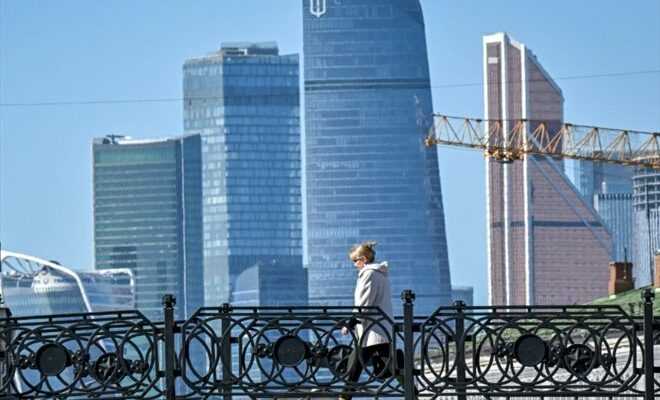The logo of French supermarkets Auchan on a shopping center in Moscow, Russia, on March 24, 2022 (AFP/NATALIA KOLESNIKOVA)
Jeffrey Sonnenfeld launched after the invasion of Ukraine a list of companies choosing to leave Russia, or to stay there, available to all consumers and investors.
Professor specializing in corporate social responsibility at the American University of Yale, he is used to discussing with the big bosses.
He chose to step up after the attack on Russia because there is no “golden mean” possible against Moscow, he explains in an interview with AFP.
– Why did you launch this list?
Right after the war started, a dozen companies took the initiative to cut ties with Russia, and they weren’t the ones that usually take the first steps on human rights or societal issues: oil companies (BP, Shell, Exxon), business services companies (McKinsey, Deloitte and major law firms), and tech giants (Apple, Oracle, Twitter, Amazon).

A woman walks in front of a Leroy Merlin store in Moscow, Russia, on March 24, 2022 (AFP/NATALIA KOLESNIKOVA)
But we soon also saw a slew of imposters, companies that, with a clever public relations team, tried to get away with misleading messages. I put together a small team with no ideology or affiliation to any of these companies to objectively assess what these companies were doing.
It was originally a list in two categories, companies that stay and those that leave. But we quickly realized that this was not enough because some companies were broadcasting very vague and ambiguous messages. We now have five categories, from companies withdrawing completely (from Russia) to those that persist.
– What prompted companies to act?
For some of the companies that moved first, it could be said that they acted in their own interest, because they were for example too involved with oligarchs and wanted to avoid having their reputation damaged.

A woman walks on a bridge in central Moscow, Russia, on March 23, 2022 (AFP/-)
Some companies that have faced controversy in recent years (such as oil companies with climate change or tech companies with the protection of private data) have used this opportunity to show that they can sometimes choose the right side.
And in some companies, the employees themselves revolted. Generation Z really sticks to certain principles and believes that where they buy, where they invest and where they work matters. Within the big consulting firms, there was definitely some anger about serving the devil.
– Some companies remaining in Russia argue that they are acting for the benefit of their employees or for humanitarian reasons. Isn’t that justified?
That companies try to justify their presence in Russia on humanitarian grounds or to supposedly take care of their employees is appalling. This is pure greed. They should be held accountable and shamed.
Companies like Nestlé and Mondelez have assured for weeks that they produce essential products. On the list of these so-called essential products are KitKat bars, Nesquik chocolate, Oreo cookies (…).
Above all, (this positioning) undermines the whole purpose of economic sanctions and voluntary corporate withdrawal. The idea is not to bring comfort to the Russian population and allow them to continue to be complacent. The idea is to make them uncomfortable, to increase their stress, so that they question their leaders.
Some seek to be understanding by saying “the Russian population only has access to filtered information”. But the Russians themselves know it (…). It is up to them to question what they are told. If they don’t, they are willfully ignorant.
Ukrainians don’t have that luxury. They were thrown a harsh reality in their faces. Russians violate ceasefires, children’s hospitals are bombed. There is no “middle ground” here.
Every day, companies let us know that they are furious (to be listed as companies still operating in Russia). They forward us the threats they receive from hacker groups like Anonymous. But that’s not our problem, it’s a choice they made. And if there are negative reactions, they just have to change their position.
© 2022 AFP
Did you like this article ? Share it with your friends with the buttons below.




